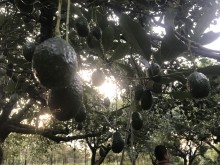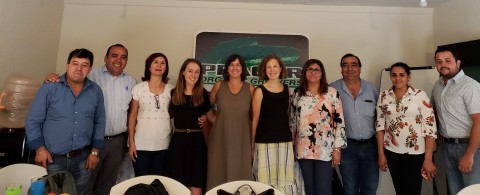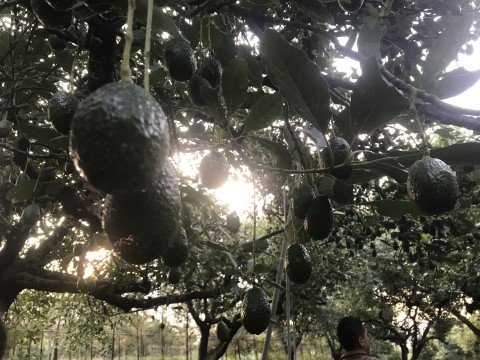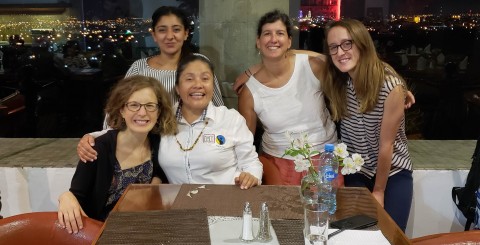By Meghan Bodo, Avocado Supply Chain Coordinator, OKE USA
What Does It Take to Start an Avocado Season?
Early September marks the beginning of the season for Equal Exchange avocados. While avocados are grown year-round by our small farmer partners in Mexico, it is during the early fall that the harvest of this creamy and delicious tropical fruit reaches a sufficient volume for Equal Exchange to begin importing and selling to our customers on a weekly basis. As the Avocado Supply Chain Coordinator, I’ve spent the past year managing the weekly logistics of import and distribution from our office in Massachusetts.

In July, however, I had the opportunity to step out of my usual role of working in the mechanics of the supply chain, and take a more bird’s-eye view. I traveled to Mexico with other members of the Equal Exchange produce team to plan for the avocado upcoming season. We traversed the volcanic soil of Michoacán, Mexico to visit avocado farmers, coop administrators, and industry colleagues. Over the course of this trip, I and gained a new perspective of the efforts required to actually set up a weekly small farmer, organic, Fair Trade avocado program.

Exploring a farm with members of the Board of Directors of a partner coop in Michoacan, Mexico.
Business Basics
Equal Exchange as an importer and as a seller of avocados plays a very different role in the avocado supply chain than our producer partners, who grow and export the fruit. Despite these different functions, Equal Exchange and our farmer coop partners have strikingly similar engagement with the larger avocado industry. Like Equal Exchange, each farmer coop coordinates with many different entities to ensure that the coop is properly certified and registered in each aspect of their business: from Fair Trade, to food safety, to tax collection, and more. Given the complexity of international trade, it is a huge amount of work to ensure that these certifications and registrations are up to date before the beginning of the avocado season.

Equal Exchange avocado team members meet with Pragor in their offices. Pragor has supplied fruit to Equal Exchange since we starting importing avocados 5 years ago.
Projecting Supply: Nature and the Market
At the orchards we visited, I immediately noticed how remarkably diverse avocados groves can be. Some groves are decades old, while others have trees that are bearing their first fruits. Farmers use a diversity of planting techniques, employ unique solutions to mitigate erosion, and use combinations of organic inputs specific to the soil needs of each individual grove.
There are many parallels between this farm-level diversity, and the fruit size diversity that I normally experience in my job. Each avocado tree produces a wide range of different sizes of fruit, which complicates marketing to U.S. retailers who each request a narrow range of sizes for their stores. For Equal Exchange, being a good partner to growers means accepting a variety of sizes from farmers. Once we receive size information for each shipment it’s my job to allocate the fruit among customers with varying preferences.
For our farmer partners in Mexico, the work is just as complicated: at the beginning of each season, farmer co-ops engage in the art and science of projecting availability of fruit sizes throughout the season, and then strategize about different markets for their fruit accordingly.
The beauty of the Equal Exchange alternative supply chain is that each player does their part to work in harmony with nature and find destinations for avocados of all sizes.

Hass avocados hang from the tree of a coop member in Michoacán, Mexico.
Managing for Climate Change
Having the opportunity to connect face-to-face with our farmer partners gave us the opportunity to not only discuss technicalities that impact our business together on a weekly basis, but also to explore long-term themes affecting the industry as a whole. Perhaps the most present, in both conversation and in the physical landscape, was climate change.
Anthropogenic climate change is already impacting the avocado farmers we met; rains have started, and stopped, at unusual times and with unusual intensity. There has been hail reported in areas where it has never been before. These phenomena are incredibly threatening to the livelihoods of small farmers growing avocados. Abnormal rains create quality problems that renders fruit unviable for sale; some farmers reported losing up to 90% of their crop due to hail damage.
Farmers also expressed distress at the damage to the environment caused by deforestation for new farmland, a widespread result of the booming avocado trade.

Loss of fruit due to hail storm (above); hail on a farm in Michoacan (below).
Strengthening the Small Farmer Movement
Equal Exchange’s commitment to our farmer partners means that we take active steps in supporting and advocating for small farmers around issues like climate change. We took advantage of our time in Mexico to meet up with colleagues doing similar big-picture small farmer advocacy work in Mexico on the regional level, such as CLAC: the Latin American and Caribbean Network of Fair Trade Small Producers and Workers. CLAC shared inspiring big-picture, long-term projects to support small-scale producers, such as linking them to local universities in an effort to research, educate and mitigate the effects of climate change.

The Equal Exchange avocado team with Jaquelina Vivanco of CLAC.
Looking Ahead
As we program the season’s first shipments of Equal Exchange avocados this month, I am feeling humbled and inspired by the talent and resiliency of our producer partners in Mexico. Back in Massachusetts, I will return to focusing on the weekly details of pricing, logistics, and distribution, but now with the understanding of and appreciation for the complexity and nuance of the avocado supply chain, and the multi-tiered collaboration that makes it all possible.
